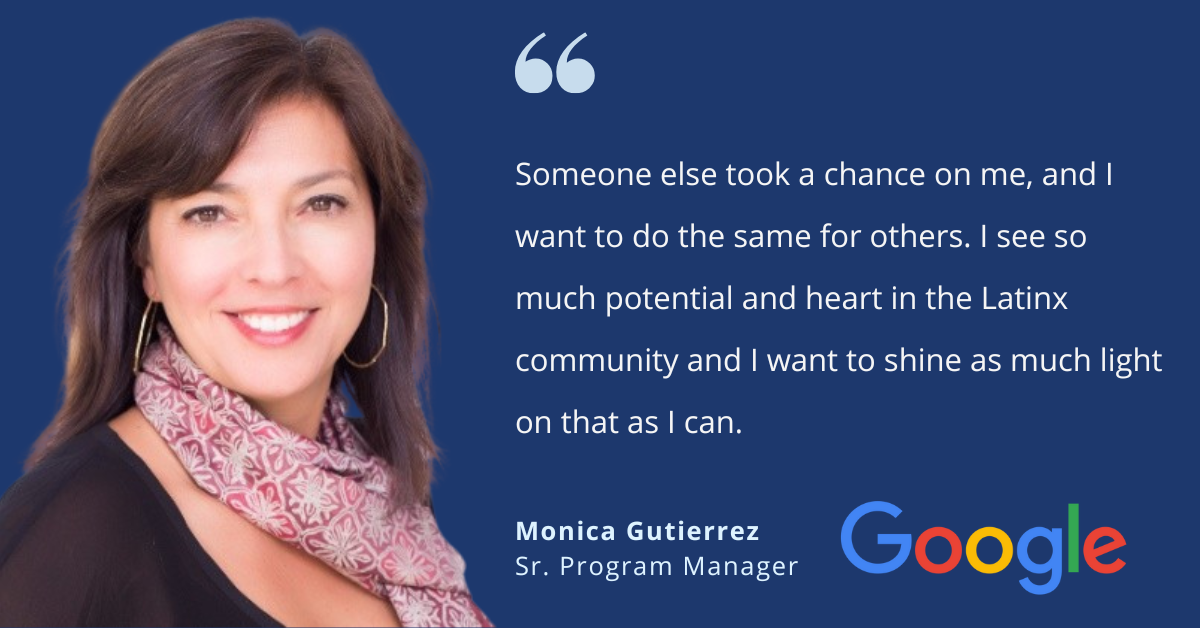If you ask for advice about how to get a job at Google, taking an improv class is probably not something you’d expect to hear.
Yet, Monica Silva Gutierrez, Senior Program Manager at Google, found that improv not only helped transform her into the effective leader she is today but also empowered her to ditch the mentality of what she calls, “second class citizen” syndrome.
“Taking feedback is not easy for a person of color. When I used to get constructive feedback at work, this ‘second class citizen’ syndrome would creep into my mind, telling me I’m not good enough and I’m never going to get a seat at the table,” she shares.
For Monica, the principles of improv helped her to take feedback and run with it, rather than taking it personally.
“Improvisation really helped me learn how to integrate professional feedback and innovate on it, which is very much a part of the culture at Google,” she says.
We sat down with Monica to find out more about how her varied experiences influenced her career trajectory and her journey toward embracing her heritage in her professional life, and the advice she has for other Latinas to find their footing in the tech world.
From Texas Border Town to Change Management Powerhouse
Monica grew up in a border town in Texas and felt the pressure early on to assimilate to American culture for the sake of her success. She had taken the last name of her non-Latinx stepfather, and she has a white-passing appearance, which made assimilating easier.
“I was never really in touch with my ‘latinidad' as we call it because I was always trying to fit in. I have white-presenting features, so I could pretend,” she reflects.
She went on to study political science at St. Mary’s University, a Hispanic-serving school. Being around thousands of young adults just like her opened the door to her Latina identity a little wider.
“I'm glad I went there and had that experience, to be surrounded by people who looked like me and came from similar places,” she says.
After graduation, Monica’s career took her through some pretty interesting — and diverse — experiences. She worked as a Political Assistant on the Clinton/Gore Presidential Campaign, at the White House in the Department of Energy, as Director of Events at a meditation ashram (where she learned about improv), and as an executive in the nonprofit sector for democracy and social justice reform organizations.
The common thread throughout these experiences has been Monica’s aptitude for taking a practical approach to managing change.
“Throughout my career, I’ve built teams, grown them to scale, and helped them pivot and change,” she explains.
The Value of Sponsorship
While working in the nonprofit sector, Monica struck up a friendship with a tech founder through her meditation community. This person became an invaluable sponsor who opened doors for her to work at the intersection of nonprofit and tech.
“He took an interest in me and my career, and had access to opportunity, which I didn't have,” she says.
When her sponsor was working as a VP at Google, he tapped her for a Chief of Staff position. Google was focused on building an inclusive culture where everyone belongs, and he was certain that Monica was the best person to navigate these changes. She wasn’t so sure.
She remembers thinking: “I'm not a typical hire. I don't have a CS background. Also, I'm more of a generalist, and Google tends to hire people who are specialists and experts.”
However, after studying up on Google culture and preparing for her interviews with the help of a recruiter and career coach, she got the job. She then spent years successfully guiding the company through a major pivot, utilizing and building on her existing skills to help organizations transform from the inside out.
Hard Conversations, Reclaiming Identity
Monica is proud to work at a place that isn’t afraid to have hard conversations and to act on the conclusions of those conversations.
“Google is on the right side of some really tough values conversations that corporate America is going through. It's curious, and it wants to find ways to solve problems with compassion. Compassion is in Google’s DNA,” she shares.
Having these hard conversations with compassion provided the space for Monica to explore her identity more. Finally, the door to her latinidad was fully opened and she now feels that she has reclaimed her Latina identity.
“There were two versions of me: one at work and one at home,” she remembers. “But Google is a place where I could explore myself more, and I've been given permission to be me. Because Google is willing to have those tough conversations, I was inspired to publicly ‘come out’ as Latina.”
Part of that coming out was changing her married name to a combination of her mother’s and grandmother’s maiden names to honor the Latina matriarchs of her family.
She has also prioritized building community as the co-founder of the employee resource group (ERG) Latinas@Google, as well as uplifting Latina talent whenever she can — she learned through experience the impact a sponsor can have, and it’s a lesson she’s never forgotten.
“Someone else took a chance on me, and I want to do the same for others. I see so much potential and heart in the Latinx community and I want to shine as much light on that as I can,” she says.
3 Tips for Latinas in a Shifting Tech World
Monica thinks that the tech landscape for Latinas still isn't ideal but she's optimistic. On the one hand, excellent talent can go overlooked; on the other hand, the needle is moving toward more equity and inclusion.
“I think there have been many improvements around hiring and retention, as well as Latina talent filling more visible roles. I think leaders are listening and want to know how they can help,” she says.
For Latinas who want to find their footing in the tech landscape during this time of transition, here is Monica’s advice:
- Even if you don’t tick every box, put your hat in the ring. Sometimes you’ll be right for the job, even if you don’t meet every single requirement, so apply anyway. Monica recalls that a junior engineer she sponsored didn’t think she had what it took, but when she applied, she was promoted. “Now her team has grown three times. She's in a new org, under new leadership who recognizes her, her ability, and her impact,” she emphasized.
- Find a community, and collectively articulate your needs to leadership. Monica points out that leadership is listening, and now is the time to clarify needs through ERGs or other collectives. “We have to get really crystal clear about precisely what it is that we want and need,” she explains.
- Don’t be afraid to bring your cultural values into the workplace. Monica says that one value in her culture is taking care of others and that this has given many employees comfort and peace of mind during corporate restructuring. “I'm usually the one in the room that advocates for making sure that people are well taken care of, fully informed, and supported through change. I think that has a lot to do with my culture,” says Monica.
If you’re looking to be on the right side of important corporate tech conversations, Google is hiring!




